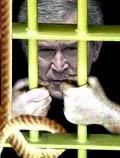| Find |
Friday, 25 January 2008
Darkness, starvation and imminent death
 Click to view caption Click to view caption |
| Palestinians carry candles during a protest in Bethlehem against the Israeli halt in fuel deliveries which forced the closure of Gaza's sole power plant |
As Gaza is completely cut off, Israel escalates its air bombing campaign in densely populated neighbourhoods
Maher Al-Nazil has asked everyone he knows help in finding an apartment to rent in the centre of Al-Maghazi Refugee Camp in Gaza. Maher lives with his wife and three daughters near a police station on the western border of the camp. He fears for his family should Israel bomb the neighbouring police station. "The image of the family whose joy over their son's wedding turned into horror and grief when the headquarters of the Ministry of Interior in Gaza was bombed last Friday remains with me, and I don't want that to happen to my wife and daughters," he told Al-Ahram Weekly.
Like Maher, most families who live near ministries, institutions and security establishments in Gaza have begun thinking about renting other homes for fear of Israeli bombs. The possibility of that for most, however, is next to zero due to impoverishment and a general shortage of apartments in the Strip. Rafiq Youssef, an officer in the Civil Defence agency, affirms that homes near targeted headquarters are in danger. "Israeli military jets, such as F- 16s, drop one-ton bombs, meaning that all the homes within 200 metres of the bombed site would be damaged," he told the Weekly.
The air targeting of ministries, institutions and security headquarters is -- so far -- the most extreme action Israel has taken with a view to forcing Hamas to halt the firing of rockets on Israeli settlements located near Gaza. Israeli Minister of Defence Ehud Barak said that Israel is escalating its military offensive in order to "heavily tax the Palestinians" and "convince them to stop firing missiles". He told Israeli army radio Friday, "We want to exhaust all the means available to us."
Israel previously destroyed numerous institutions of the Palestinian Authority a year and a half ago when the military wing of Hamas captured Israeli soldier Gilad Shalit. The bombing campaign that followed did not cease until Israel realised its strategy would not force Hamas to hand over the soldier, or lower the conditions it placed on swapping him for Palestinian detainees in Israeli prisons.
The destruction of official institutions was the climax of an Israeli ground invasion that led to an extensive loss of life. The height of the killing was witnessed when occupation forces invaded Zeitoun neighbourhood in southern Gaza City, in which 19 Palestinians were killed including 13 members of the Ezzeddin Brigades, the military wing of Hamas, one of whom was the son of Mahmoud Al-Zahhar, the prominent Hamas leader. Within five days, 38 people were killed, including 18 unarmed civilians. Occupation soldiers killed some as they attempted to help the injured, such as Mohamed Al-Issa, 70, who Israeli soldiers shot dead as he attempted to help a young neighbour wounded in the invasion of Zeitoun.
Israel is not finished with its present escalation. Indeed, it has threatened to assassinate Hamas's political leaders, including elected Prime Minister Ismail Haniyeh, Al-Zahhar, and former Minister of the Interior Said Siyam, should the firing of rockets not stop. Amnon Abramovich, the well- known Israeli commentator, says that the threat to assassinate Hamas leaders is worthless if genuine. "This kind of tactic has never worked with Hamas," he said on Friday Studio, broadcast last week by Israeli Channel Two. "We assassinated its founder and leader, Sheikh Ahmed Yassin, and yet they did not stop striking at us," he continued.
Israel is not only demanding that Hamas stop firing rockets, but that it also force all other Palestinian factions to do the same, even while Israel refuses to recognise Hamas a controlling political force in the Gaza Strip.
As for economic pressures, contained in the Israeli- imposed siege of Gaza and embargo on fuel and electricity, they reached their climax in Barak's decision to completely close all border crossings leading to the Gaza Strip, meaning that basic foodstuffs and fuel will not enter the Strip. This is direct starvation -- with grave ramifications in humanitarian terms. Gaza is now effectively cut off from the world, plunged into darkness, and hostage to the whims of Israel's air commanders and their weapons.
Last Sunday, Maariv newspaper reported that a top officer in the Israeli army had said that the military and economic pressures placed by Israel on the Gaza Strip aimed to force the Palestinian public to revolt against Hamas's rule. This top officer's statement was in harmony with public statements made by several Israeli ministers. Yet it appears that Israel is betting the wrong way. According to an opinion poll conducted by Al-Mustaqbal Centre for Research, whose headquarters are in Gaza, Hamas has maintained its popularity while the popularity of Fatah -- the main alternative, in terms of organisation capacity -- has declined, particularly in the West Bank.
Essam Adwan, professor of political science at Al-Aqsa University in Gaza, believes the result is logical. "Although the standard of living for Palestinians has declined significantly under the Hamas government, wide sectors of the Palestinian public continue to support Hamas because Israel is warring against it," he told the Weekly.
Siyam holds that military and economic pressures on Hamas do not only aim to halt the firing of rockets, but also relate to Shalit. "We will not concede any stipulation we have placed on the release of Shalit, and Israel must release the list of Palestinian detainees passed on by Egyptian intermediaries," he told the Weekly.
With regard to future resistance operations in light of the Israeli escalation, Siyam stresses that Hamas will continue its resistance until the Palestinian people gain their legitimate and legal rights. He added that never has a people under occupation gone back on its demand for national rights simply because the occupying power oppressed it.
Hamas holds that Israel's present escalation comes on the back of a green light granted to it by US President George W Bush during his visit to Tel Aviv. Fawzi Abu Barhum, the movement's spokesperson, says that the American administration granted Israel complete permission to carry out its crimes. "The statements of the spokesperson of the US State Department, that consider the occupation forces' actions in Gaza self-defence, prove that the US administration is involved in committing war crimes in Gaza -- that it is justifying crimes against our Palestinian people," he told the Weekly.
"This proves that the Israeli occupation and the US administration are continuing their war of extermination against our land and people," he added.
Yet it is also clear that Israeli military escalation is the outgrowth of a sense of impotence in Israeli government and army circles following the collective emigration of settlers who lived near the Gaza Strip due to the firing of rockets. Statistics issued by the Department of Education in Siderot -- the settlement most subjected to shelling -- show that most families have left the city in fear. Conditions there have reached the point where Israeli Interior Minister Avi Dichter warned Prime Minister Ehud Olmert last Sunday that Siderot would collapse if an end were not put to the firing of rockets from Gaza.
Calls have since been made in Israel to seek a solution other than a military one. In his editorial in Yediot Aharonot, well- known journalist and news presenter Yair Lapid wrote that the Israeli army does not have a solution to the problem of rockets, and that an understanding must be reached with Hamas over a truce. Lapid suggested that it would be dangerous to try to stop the firing of rockets through intensifying military operations or by trying to reoccupy the Gaza Strip, noting that estimations of the Israeli army confirm that an invasion would result in the death of dozens of soldiers. Lapid stressed that Israeli society cannot accept the loss of its soldiers.
In the same newspaper, Yegal Sirna warned of the outcome of betting on military solutions. He wrote that he had spoken to a hundred retired intelligence agency officials and that all of them had told him that popular resistance to occupation could not be crushed. "Without any real political negotiations, Gaza will poison out soul, and no means of protection will be able to save Siderot," he wrote. "Siderot and Khan Younis and Beit Hanoun are connected to each other like Siamese twins," he added. Link
Posted at
11:49
![]()
Post Title: Darkness, starvation and imminent death
![[Zionazis-1.jpg]](https://blogger.googleusercontent.com/img/b/R29vZ2xl/AVvXsEg_x8DOGucgHQmfJJujuK_oYJdxhEnskhQqt-Og7lSk52HeaDQYzW8NQWfdpHmPgj_FJN0jJ3tz1prR1jVZHdHky2HDQxxcs4LVxX0DtAt3fG0sfRr6MDx7Sz8cJNjl0k0RS9TbCjangQ/s1600/Zionazis-1.jpg)




